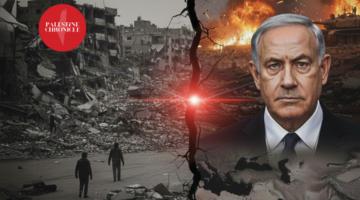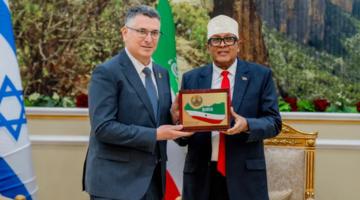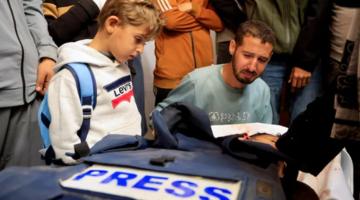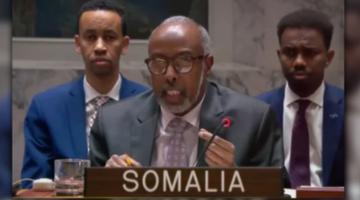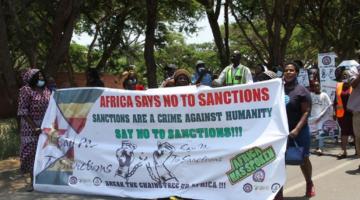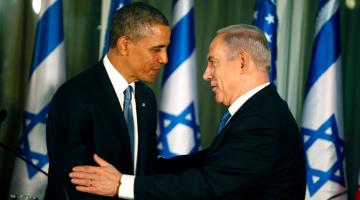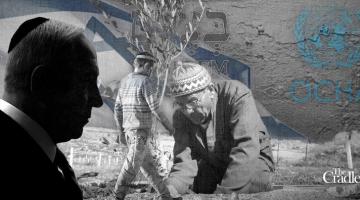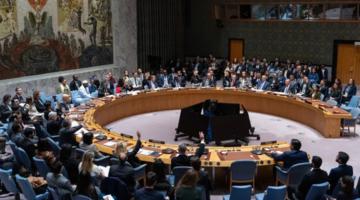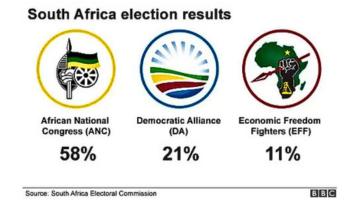BDS South Africa staged a Palestine solidarity protest in the Limpopo province in 2014
Originally published in ROAPE
ROAPE interviews South African Human Rights activist and academic Salim Vally on Israel’s genocidal war on Gaza and the relationship between Palestinian liberation and Africa. Vally argues that Israel’s military campaign is rooted in 75 years of Israeli settler colonialism and ethnic cleansing. He also discusses the shifting positions of African countries in the conflict, noting the complex role of Egypt, and delves into the comparison between the Israeli regime and South African Apartheid based on recent human rights reports. He ultimately calls for African support for Palestine against Israel’s military-industrial complex, which is backed by Western imperialism.
What are the roots of the current Israel war on Gaza, which led to the bombing and forced displacement of millions of Palestinians from North Gaza?
The mainstream narrative presents the latest Israeli bombing as a response to “unprovoked” attacks by the Palestinian resistance on 7 October. It, however, neglects the broader context. The latter includes British colonialism and the Nakba 75 years ago, where Zionist terror gangs eradicated 418 Palestinian towns and villages and ethnically cleansed 80 per cent of the indigenous Palestinian population–over 750,000 people. Today two-thirds of Gaza’s population of 2.3 million are refugees and their descendants, victims of the Nakba in 1947-1948, the 1967 displacements and ethnic cleansing in more contemporary times. The people of Gaza, 50 per cent of whom are children, have endured profound suffering, forced displacement, and a brutal 17-year-long inhumane medieval-like siege and blockade, including five major brutal regular Israeli carpet bombings, which the Israeli generals and politicians refer to as “mowing the lawn”. Human rights organisations have long characterised Gaza as the largest open-air prison, which morphed into a concentration camp and now an extermination camp.
To what extent does the rise of far-right in Israel have a part to play in the current crisis?
The present genocidal attack is the wet dream of the Israeli far-right. They have long argued for ‘finishing the Nakba’ and a ‘final-solution’. The presence of Itamar Ben-Gvir, the minister for internal security in Netanyahu’s government along with other far-right ideologues, including Avigdor Moaz overseeing school curriculum and Bezalel Smotrich the Finance Minister responsible for building settlements in the Occupied Territories, effectively jettisons the old tropes liberal Zionists employed to defend Israel — that it is the only democracy in the Middle East, that it seeks a peaceful settlement with the Palestinians in a two-state solution, that extremism and racism have no place in Israeli society and that Israel must impose draconian forms of control on the Palestinians to prevent terrorism.
Ben-Gvir is a disciple of the genocidal rabbi Meir Kahane and considers Baruch Goldstein “a hero.” On 25 Feburary 1994, Baruch Goldstein a US-born settler entered Hebron’s Ibrahimi Mosque wearing his IDF reserve uniform with a Galil rifle. He opened fire during Muslim morning prayers and killed 29 Palestinians. Ben-Gvir displayed a portrait of the mass murderer Baruch Goldstein in his living room. The profoundly racist Kahanist ideology Goldstein ascribed to has a deep influence on Israeli policy today. The ideology that led to the massacre isn’t just history. The same ideology is mainstream in present-day Israel and massacres are carried out no longer by individual gunmen but coordinated by the army and police with regularity.
Avigdor Maoz from the extremist Noam Party, opposes LGBTQ rights, is a misogynist and has been appointed to oversee the Israeli school curriculum. Other notorious members of the government include Zvika Fogel who chairs the Israeli Parliament’s National Security Committee – not too long ago Fogel called for a “final war” against Palestinians, to “subdue them once and for all”.
The old tropes Israel employed to justify itself were always more fiction than reality in any case. Israel long ago became an apartheid state. It directly controls through its illegal Jewish-only settlements, restricted military zones and army compounds, over 60 per cent of the West Bank and has de facto control over the rest. A high priority of the government is the further annexation of the Naqab (Negev) desert and the Galilee in Israel’s south and north, respectively, where many Palestinians reside. They have already made clear their desire to formally annex large sections of the West Bank, including “Area C” where up to 300,000 Palestinians live. Netanyahu intends to construct 10,000 new housing units in nine illegal Jewish settlements in the West Bank.
The old tropes are being replaced by screed-filled diatribes that paint Palestinians and Arabs (Muslim and Christian) as contaminants and an existential threat to Israel. This hate speech is accompanied by a vicious internal campaign to silence Jewish “traitors,” especially those who are liberal or left-wing and secular.
In what ways might the Palestinian crisis express the failure of the Oslo peace process? Is fair to say that the two-state solution is a myth?
The extensive criticism of the Oslo Accords and the warnings by the likes of the Palestinian-American intellectual, Edward Said and the poet Mahmoud Darwish has come to fruition. The Oslo Accords which were meant to freeze the building of settlements in fact resulted in a massive proliferation of settlers numbering over five hundred thousand settlers in the occupied territories making a two-state denouement impossible apart from a parody of a sovereign state without contiguous territory and no real powers – less than the Bantustans that existed in South Africa.
Referring to the Oslo Accords, Prof Haidar Eid, A South African-Palestinian currently displaced to the south of Gaza (and whose house and university were bombed as well as many colleagues and students killed with their family members) wrote in June 2020:
They kept feeding this delusion for 27 years, refusing to admit the economic, political and even physical impossibility of establishing a truly sovereign Palestinian state amid an active colonisation project and lack of territorial contiguity…The painful question we must ask today is whether, since 1993, we have been forced to endure horrible massacres, a genocidal siege, the unstoppable seizure of our land, the building of an apartheid wall, the detention of children and entire families, demolition of homes, and many other abuses only because a comprador class saw “independence” at the end of a closed tunnel…Before he left us, Said published two pieces, Israel-Palestine: A Third Way and the only alternative, in which he offered a solution based on “equality or nothing”, one that can be materialised with the establishment of a secular democratic state in Palestine in which all citizens are treated equally regardless of their religion, sex, and colour. A comprehensive peace, he postulated, means that Israel, the colonising power should acknowledge the right of Palestinians to exist as a people, their right to self-determination and to equality, as the white colonisers did in South Africa.
Why do you think Hamas chose this moment in history to launch its biggest-ever attack on Israeli territory?
Many commentators in the West have wrongly ascribed the attacks to the Iranian influence on Hamas and the changing regional dynamics, including a likely normalisation process with Saudi Arabia following the ‘Abraham Accords’ with Morocco, Bahrain, United Arab Emirates and Sudan. More compelling is the view that sees the Hamas action, despite its ingenuity and audacity, as akin to the Warsaw Ghetto Uprising against a much more militarily superior adversary. The more likely factors that contributed to the attacks on 7 October include the 17-year-long strangulation of Gaza and the likelihood of a sixth bombardment of Gaza since 2007; the expansion of settlements; the Israeli state’s enabling of increasingly violent settler pogroms in the occupied West Bank and Jerusalem; the frequent desecration of the Al Aqsa compound and the increasing arrests and maltreatment of Palestinian political prisoners, including children.
What has been the position of most African countries on the Israel-Palestine conflict? Can lessons be drawn from the African anti-colonial and anti-imperialist struggles of the second half of the 20th century for the Palestinian liberation struggle today?
The establishment of the Non-Aligned Movement (NAM) in 1961 and the role played in its inception by Indonesia’s Sukarno, India’s Nehru, Egypt’s Nasser and Ghana’s Nkrumah helped connect anti-colonial struggles in Africa and Asia with the Palestinian struggle. Support from Cuba, the Soviet Union and its allies also brought together anti-imperialist struggles. This direct contact proved to be important for the PLO to establish connections and pursue support within the continent and to assist in countering Israel’s Africa strategy, at least in the UN and other multilateral fora (even if there were contradictions with the bilateral relations some African states had with Israel).
Historical ties forged through these common struggles for national liberation in Africa and Palestine have shifted considerably in recent years. Many states on the African continent are normalising relations with Israel, opening up diplomatic relations and economic partnerships, and ignoring the commitment enshrined in the African Charter on Human and Peoples’ Rights to fight against apartheid, racism and Zionism.
In North Africa, there is still some government and much popular support for Palestine, as manifested in the ‘Arab Spring’ uprisings and, recently, in the Algerian Hirak. But for young people in many sub-Saharan countries, whose identification with their own national liberation struggles has diminished, relations with the Palestinian Authority, PLO and the Palestinian people are not very resonant. Many younger Africans feel let down by erstwhile liberation movements that have failed them in government and appealing to a shared liberatory past is no longer an automatic identification.
There is increasing military cooperation between Israel and some African regimes whose arms purchases finance Israel’s genocidal practices against Palestinians and fuel repression and wars in Africa. Israeli sales of military hardware, and surveillance and security technologies such as Pegasus spyware to various African governments undermine democracy and the rights of the people on our continent. Israel attempts to greenwash its Apartheid crimes by selling water and agro-technology to African countries. In fact, these projects are unsustainable and destructive to local communities. Israel also hopes to mobilise African votes in UN bodies and is grooming partners to substantially shift the African multilateral position away from support for the Palestinians in multilateral fora and to develop reliable African bilateral partners. Styling itself as a “start-up nation”, Israel promotes an image of a country based on innovatory Small-Medium Enterprises that offer high-tech, low-cost solutions for sustainable agriculture, water technology and renewable energy. This puts a sustainable development façade to its export of security- and military-related technology. (Recently, however, a number of scandals related to the activities of Israeli cyber companies have begun to tarnish Israel’s image.)
At the same time, Christian Zionism, which seeks to provide a theological justification for Israel’s apartheid crimes, is being funded and promulgated through the proliferation of fundamentalist churches in Africa, often linked to conservative Christians in the West. It is proving a powerful way to mask Israeli racism towards Africans and create a pro-Israeli narrative within civil society.
A combination of these developments created the conditions to allow the African Union Commission chair, Moussa Faki Mahamet, to unilaterally accept credentials from the apartheid Israel ambassador in July 2021. Allowing apartheid Israel into the Union clearly and flagrantly contravenes the AU Constitutive Act, which commits the AU to “promote and protect human and peoples’ rights in accordance with the African Charter on Human and Peoples’ Rights (ACHPR)”. Indeed, the African Charter itself makes a pointed commitment on behalf of Africans to “eliminate colonialism, neo-colonialism, apartheid, [and] Zionism”. It was clear in the AU debate that there was no agreement on accrediting Israel. Major countries from each African region and those that played a key role in the establishment of the AU – Nigeria from West Africa, South Africa from Southern Africa, Algeria from North Africa, and Tanzania from East Africa – all voiced their strong opposition. Their positions were supported by a number of other African foreign ministers. South Africa explicitly linked Israel with apartheid South Africa and, along with Namibia, spoke out against the crimes of Israeli apartheid.
As a result of these developments, solidarity organisations and activists in March 2022 launched a Pan African Palestine Solidarity Network (PAPSN) in Dakar Senegal. Participants came from Botswana, Cameroon, Cote d’Ivoire, the Democratic Republic of the Congo, The Gambia, Ghana, Guinea-Bissau, Kenya, Malawi, Mauritania, Morocco, Mozambique, Namibia, Nigeria, Senegal, South Africa, Sudan Tanzania, Tunisia, Zambia and Zimbabwe.
What is Egypt’s role in the current crisis, given that it shares a border with Gaza?
The 2011 uprisings that saw the overthrow of Mubarak exacerbated tensions with Israel, particularly during the Mohammed Morsi presidency, given the Muslim Brotherhood’s anti-Zionist rhetoric, their relations with Hamas and Morsi’s opening the Rafah crossing into Gaza. In April 2011, under the interim leadership of the Supreme Council for the Armed Forces, Egypt brokered a Fatah-Hamas reconciliation agreement. After General Abdelfattah El-Sisi ousted Morsi in a coup in 2013, relations between Egypt and Israel improved again. The uprisings and their aftermath showed, however, that while the Egyptian elite and the military regarded the peace accord with Israel to be beneficial, popular opinion was behind the Palestinian struggle. According to a 2019-2020 survey by the Arab Centre for Research and Policy Studies only 13% of Egyptians support diplomatic relations with Israel, while 85% oppose it. Under Sisi’s authoritarian rule, the harsh suppression of civil society and opposition parties made it impossible to openly organise Palestinian solidarity from within Egypt.
How accurate is the comparison between the Israeli regime with South African Apartheid?
Well to start with, both societies as settler colonial formations were formed by Europeans, overseen by British imperialism. They enacted their particular racist states in 1948 relying on white supremacy and its ‘civilising mission’ complemented by the messianic ‘God’s chosen people’ view and the gift of a ‘promised land’ based on the Bible — at the expense of indigenous people.
In addition to identifying with the struggle of Palestinians, South Africans also recognised Israel’s culpability in their own oppression. For instance, Israel was an important arms supplier to Apartheid South Africa despite the international arms embargo, and as late as 1980, 35% of Israel’s arms exports were destined for South Africa. Much has been written about the subsequent relationship between apartheid South Africa and Israel. It will suffice here to say that Israel was loyal to the Apartheid state and clung to the friendship when almost all other relationships had dissolved. During the 1970s this affiliation extended into the field of nuclear weaponry when Israeli experts helped South Africa to develop at least six nuclear warheads and in the 1980s, when the global Anti-Apartheid Movement had forced their states to impose sanctions on the Apartheid regime, Israel imported South African goods and re-exported them to the world as a form of inter-racist solidarity. Israeli companies subsidised by the South African regime despite the pittance they paid workers were established in a number of Bantustans.
Strong bonds were also forged between Palestinians, the PLO and South African liberation organisations. There are also clear similarities between the 65 odd pieces of discriminatory legislation in Israel that governs all aspects of everyday life, the fragmentation and theft of the land and the matrix of security laws with what existed in South African Apartheid. While the laws are similar, they are not the same and actually apartheid Israel is much more severe than what existed in South African. An important critical difference though is that apartheid South Africa depended on the super exploitation of the labour of indigenous Black people. In Israel the indigenous Palestinians are disposal and expendable.
Over the past few years, a number of organisations have concluded that systemic and widespread discriminatory Israeli policies and practices against the Palestinians amount to a violation of the international convention on the suppression and punishment of the crime of apartheid. Of course, Palestinians and South Africans have been saying this for decades. The Special Rapporteur Francesca Albanese in her recent report on human rights in the occupied territories laments that “while the international community has not fully acted upon it” she makes the point that “the concept that Israeli occupation meets the legal threshold of apartheid is gaining traction”.
A brief mention of these reports: In January 2021, B’Tselem, the Israeli human rights organization, released a report unambiguously titled A Regime of Jewish Supremacy from the Jordan River to the Mediterranean Sea: This Is Apartheid. Three months later, Human Rights Watch, echoed this finding when it issued an exhaustive report, including extensive legal analysis, which concluded damningly that Israeli authorities are committing crimes against humanity, in the form of apartheid and persecution of the Palestinian people. A year later, in January 2022, Amnesty International, issued a report titled Israel’s Apartheid against Palestinians: A Cruel System of Domination and a Crime against Humanity. The latter report’s key components include territorial fragmentation; segregation and control; dispossession of land and property; the denial of basic economic and social rights and the suppression of Palestinian’s human development.
In addition, I’m aware of numerous theses and dissertations over the years that speak to these issues and many books about apartheid in South Africa and Israel such as Abdelwahab M. Elmessiri book as early as 1976, Israel and South Africa: The Progression of a Relationship to an edited collection to the edited book by Illan Pappe in (2015) Israel and South Africa: The Many Faces of Apartheid.
The most recent report, Francesca Albanese’s September 2022 report to the UN General Assembly requires some discussion. It significantly speaks to some limitations of the apartheid framework: It’s important to mention some details:
(a) First, with few exceptions, the scope of recent reports on Israeli apartheid is primarily “territorial” and excludes the experience of Palestinian refugees. She says the recognition of Israeli apartheid must address the experience of the Palestinian people in its entirety and in their unity as a people, including those who were displaced, denationalized and dispossessed in 1947 –1949 (many of whom live in the occupied Palestinian territory);
(b) Second, a focus on Israeli apartheid alone misses the inherent illegality of the Israeli occupation of the Palestinian territory, including East Jerusalem. The Israeli occupation is illegal because it has proven not to be temporary, is deliberately administered against the best interests of the occupied population. Its illegality also stems from its systematic violation of at least three peremptory norms of international law: the prohibition on the acquisition of territory through the use of force; the prohibition on imposing regimes of alien subjugation, domination and exploitation, including racial discrimination and apartheid; and the obligation of States to respect the right of peoples to self -determination.
(c) Third, the apartheid framework does not address the “root causes” which Albanese calls settler colonialism – a war crime under the Rome Statute.
About two months after the Special Rapporteur’s report, the Palestinian human rights organization Al-Haq in its report Israeli Apartheid: Tool of Zionist settler colonialism echoes Francesca Albanese and expands the current international discourse on apartheid, and importantly, examines apartheid as a structural element of furthering Zionist settler colonialism on both sides of the Green Line and against the Palestinian people as a whole. The report adds clear Palestinian voices and analysis to the wider international calls demanding an end to Israel’s apartheid regime. To quote: “Palestinian civil society demand decolonisation and dismantling of Israel’s settler colonialism and apartheid regime, the fulfilment of the inalienable right of the Palestinian people to self-determination, systematically denied since the British mandate, and the right of refugees and exiles in the diaspora to return”.
Why should Africans support the struggle to free Palestine?
Jeff Halper’s book War Against the People, shows us how Israel through its high-tech weaponry, ‘securitisation’ and methods of pacification plays a key role in the global suppression of human rights. It makes the very important point that the occupation:
…represents a resource for Israel in two senses: economically, it provides a testing ground for the development of weapons, security systems, models of population control and tactics without which Israel would be unable to compete in the international arms and security markets, but no less important, being a major military power serving other militaries and security services the world over lends Israel an international status amongst the global hegemons it would not have otherwise.
A reading of imperialism shows that apartheid Israel is needed as a fundamentalist and militarised warrior state not only to quell the undefeated and unbowed Palestinians but also as a rapid response fount of reaction in concert with despotic Arab regimes to do the Empire’s bidding in the Middle East and beyond.
We have to recognise that the foundation of the Israeli economy was founded on the special political and military role which Zionism then and today fulfils for Western imperialism. While initially playing its role to ensure that the region is safe for oil companies it has also carved out today a niche market producing high-tech security essential for the day-to-day functioning of Imperialism. The weaponry and technology the Israeli military-industrial complex exports around the world are field tested on the bodies of Palestinian men, women and children. As Adam Hanieh argues, “It is not merely the depth of suffering or length of exile that makes the Palestinian struggle an imperative of international solidarity in the current period. It is also the central location of the struggle within the broader context of global resistance to imperialism and neoliberalism.”
Salim Vally is an South African Human Rights activist and Professor and Director of the Centre for Education Rights and Transformation (CERT) at the University of Johannesburg and the National Research Foundation’s South African Research Initiative’s Chair in Community, Adult and Workers Education (CAWE).


